Inside Oxford University’s Gaza student protests – where an Israeli MP made a bold appearance
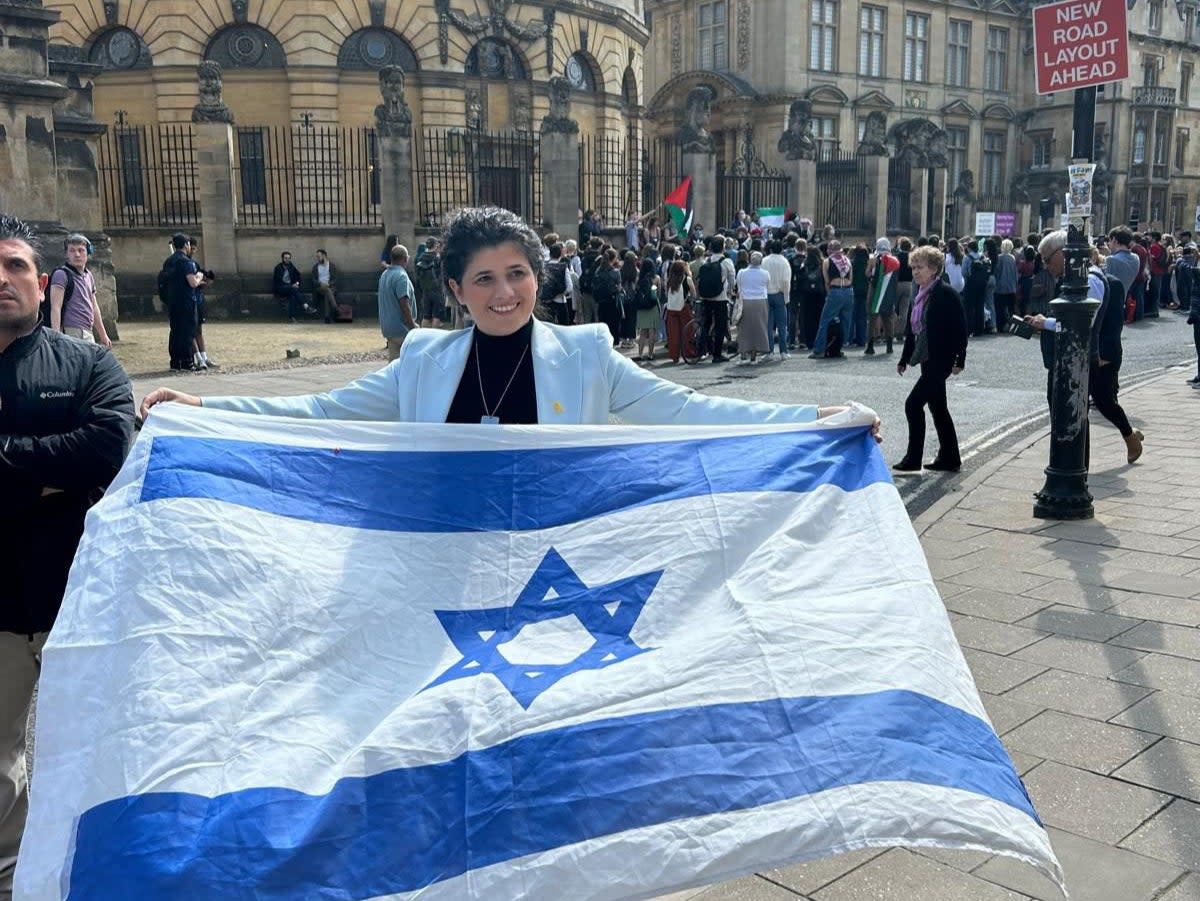
- Oops!Something went wrong.Please try again later.
It’s a moment that in the current mood could have quickly turned ugly.
Outside Oxford’s Sheldonian Theatre, as 200 student protesters group together for a rally and fill the area with chants such as “Palestine will live forever”, an Israeli flag unfurls in the crowd.
The blue Star of David waves in the breeze as observers quickly look to its bearer, Israeli politician Sharren Haskel, who smiles confidently for photographs and video taken by her aides.
The bold move by the member of the opposition party New Hope shocks those within eyeshot, including nearby police officers, but clearly none knows who the smartly dressed politician is.
@SharrenHaskel standing strong at #Oxford !!@KnessetCAC @IAF_Europe pic.twitter.com/K4BSUzqobo
— Josh Reinstein (@ReinsteinJosh) May 8, 2024
And just as well, for her comments to us – calling the protesters “idiots” as she says she is standing up for intimidated Jewish students – threaten to quickly turn the mood of the until now peaceful event.
But with the crowd beginning to gather around, she’s quickly whisked away.
Just a five-minute walk from the rally, students at Oxford University are in the third day of their so-called “liberation zone” encampment on the lawn outside the city’s Natural History Museum.
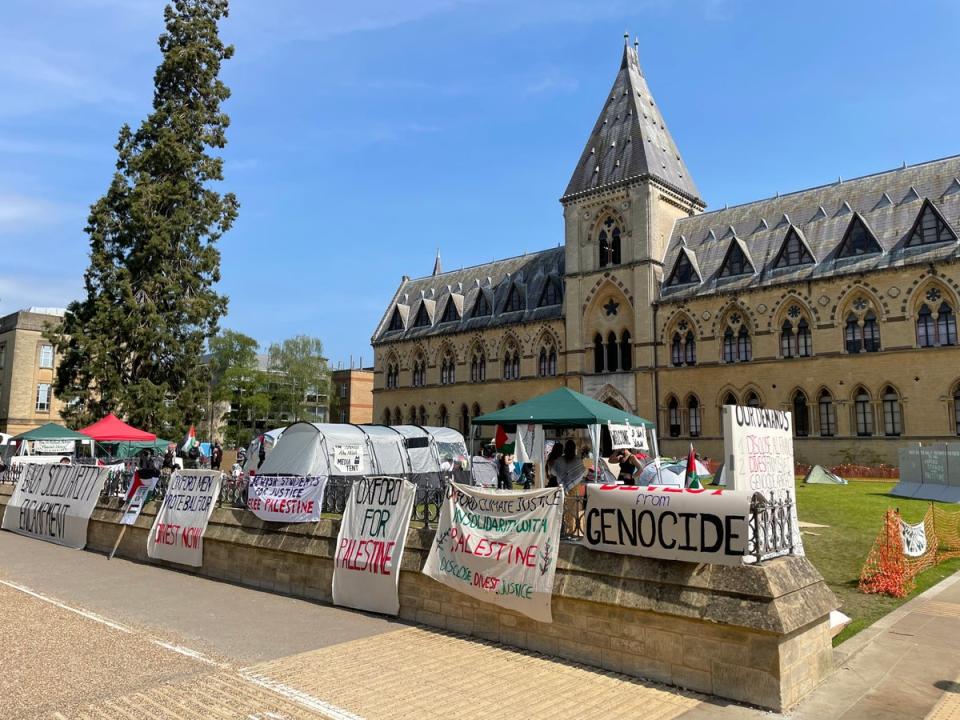
Around 40 tents covered with flags and handwritten signs are dotted among the casts of fossilised prints of a megalosaurus dinosaur.
Cardboard, wood and even carpet have been laid out to provide a frowzy walkway separating the tents from zones that include a library and study, a canteen serving donated food and a media area.
There’s even a tent for sun cream.
There are activities with a busy hour-by-hour programme featuring a morning forum entitled Democracy and an afternoon talk called The Great Uprising of the Arab Revolt.
It’s got a festival vibe, but make no mistake, it’s also ruthlessly organised and self-policed.
As we head through the only entrance, one student with their face covered with a surgical mask calls over to us: “Are you here for the camp?”
Standing under the shade of a canopy with a handwritten “welcome” sign above it, protesters are busy bringing aboard new participants, while also dealing with a stream of journalists.
“We don’t like the Daily Mail,” says one as I enquire if everyone is allowed in after providing my own credentials. “Independent? We saw a piece you guys ran a few days ago,” she says.
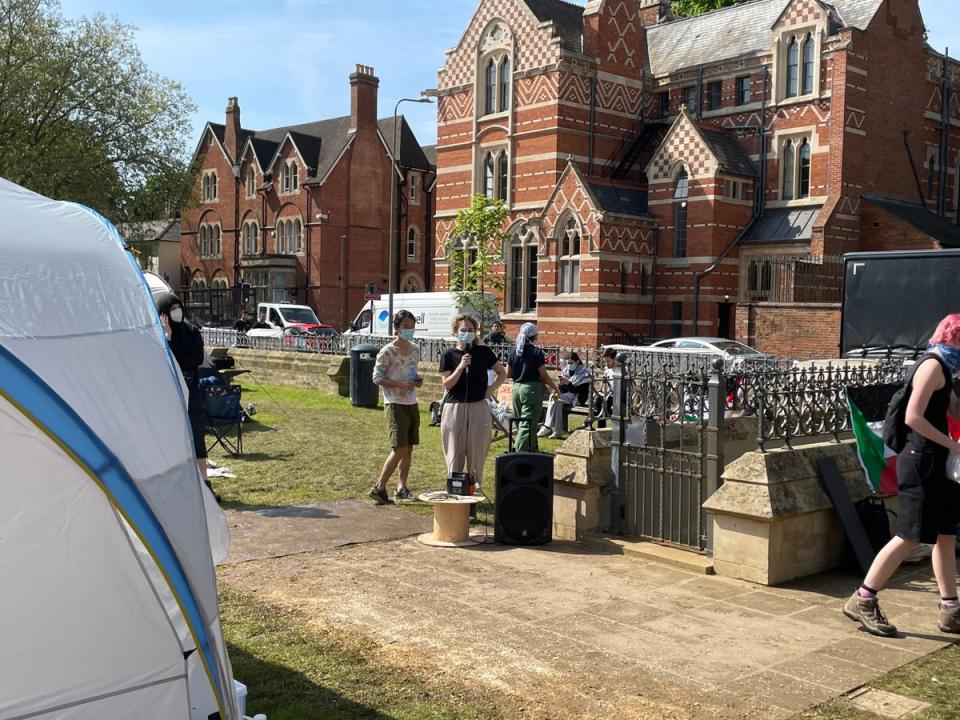
And that is enough to gain entry as we are then led on a tour of the makeshift camp in which the students, most of them masked due to “security concerns”, appear relaxed amid the upturn in the weather.
A protester picks up a microphone. “Your daily news from Gaza,” he says, before providing a few hand-picked headlines about the conflict almost 3,000 miles away.
Another person then picks up the mic to remind people to stay hydrated. Dealing with one emergency was enough, she said, as the camp can’t afford to deal with medical emergencies in camp.
“We intend to stay here for as long as we’re able to put pressure on the university through this action,” says Amy Tess, who reads off a list of demands including Oxford overhauling its investment policy, boycotting “Israeli genocide, apartheid and occupation” and divesting from military firms.
“And if it becomes time for us to maybe do something else as well, we absolutely have the numbers and the support for it,” she says. “So we will keep taking action until the university meets our demands.”
But so far, as students freely admit, there’s been little response from the university, or the police. In a statement issued to us, a spokesperson for the university said it respected the right to freedom of expression in the form of peaceful protests.
We were told by police on the ground that despite efforts to talk to the protesters, they had been unable to engage.
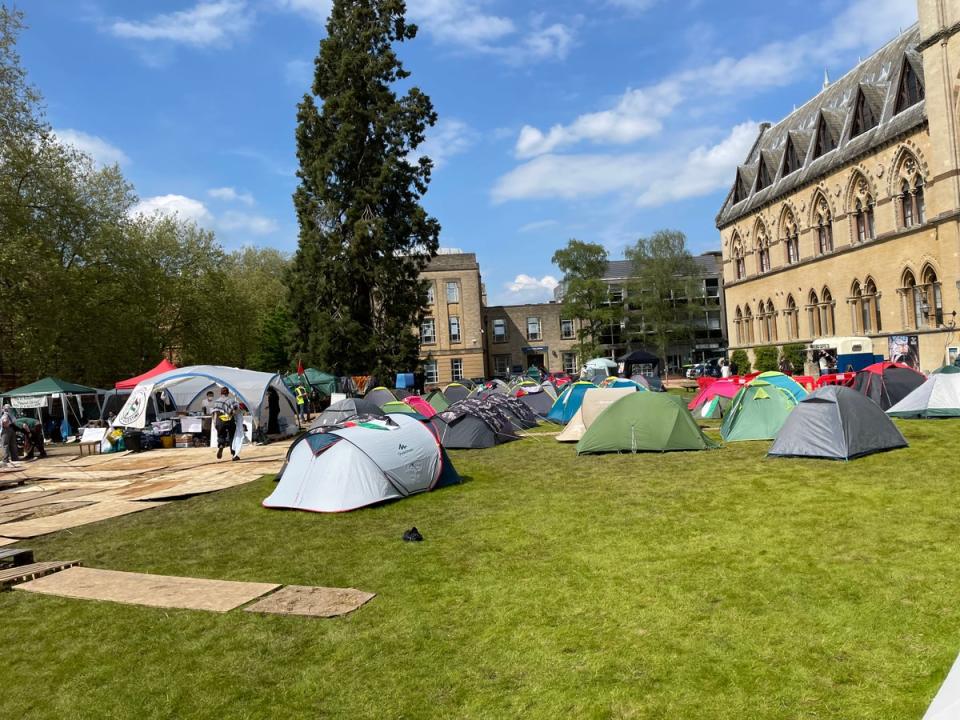
Pressure is growing on Oxford University, along with other universities where similar protests are taking place, as Rishi Sunak called on them to remain “bastions of tolerance” while discussing combating antisemitism and keeping Jewish students safe.
Edward Isaacs, president of the Union of Jewish Students, claims the political statements at such protests are direct calls for violence.
But back at the camp, Amy Tess insists there is no intimidation of Jewish students, and that the movement has support from all religions. They also claim to have strong support from those in the colleges, with more than 300 faculty and staff signing a letter of backing.
One Jewish student who did not wish to be named tells us he does not feel intimidated, but rather uncomfortable about what his friends taking part in the protests now thought of him.
”The fact that the prime minister made that comment [on concerns over a rise in antisemitism from university protests] and wanted to raise such an alarm about this issue shows how much he is trying to distract from the real issue at hand,” Amy Tess says.
“The reality is that we have Jews, we have Christians, we have Muslims, we have atheists, we have everybody at this encampment saying no to genocide; it really should not be a controversial issue for universities to not be profiting off of weapons investments, it really shouldn't be.
“Honestly, if we want to talk about feeling unsafe, I am very, very focused on the millions of people who are about to die.”
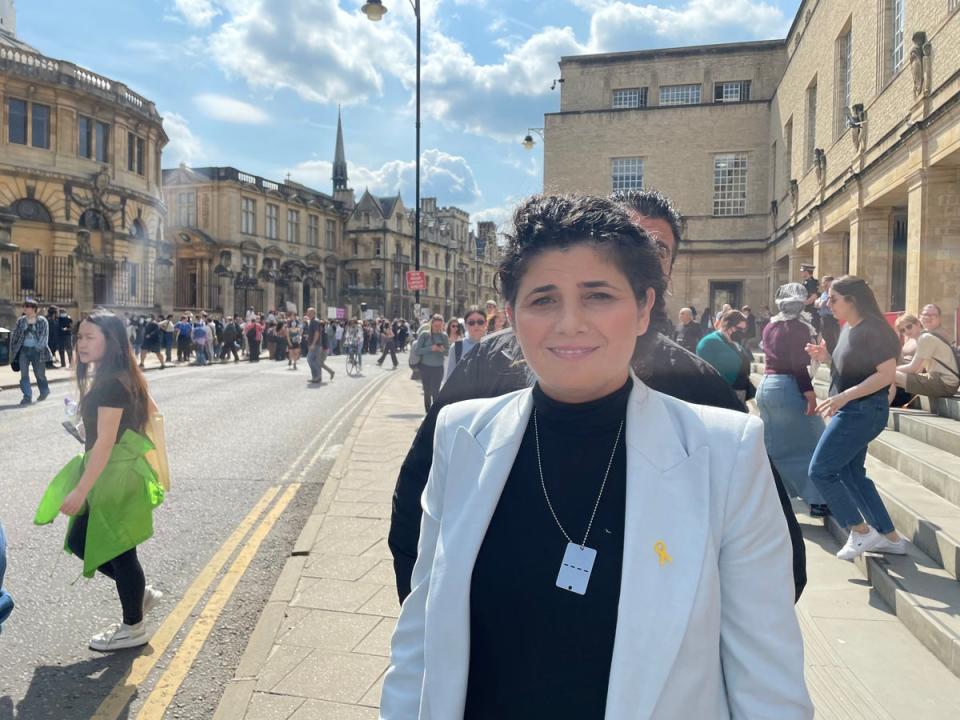
We’re next introduced to Sam, a 19-year-old politics and philosophy student from Tunbridge Wells. Wearing a keffiyeh scarf, he laughs when we ask about the sleeping conditions. “I’ve done DoE [Duke of Edinburgh], so I actually like the camping,” he says.
He has exams in four weeks and I ask if the protest will get in the way. “I think the scope of this issue far outstretches whether or not I get a first or second,” he says.
“I think if I were to look back this point in time, and I thought to myself, ‘what was I doing?’ Was I focusing on doing slightly better on an essay that doesn't really have much bearing on anything, or was I taking part in a movement trying to stop the genocide?”
As global media attention intensifies on the protest in Oxford, media reports suggest students taking part have signed a pro-Palestinian manifesto that upholds the Thawabit, a set of demands laid down by the Palestinian Liberation Organisation in the 1970s.
Organisers would not show us the form. But we saw a shared version, which appeared to show members agreeing to call for making Jerusalem the capital of Palestine.
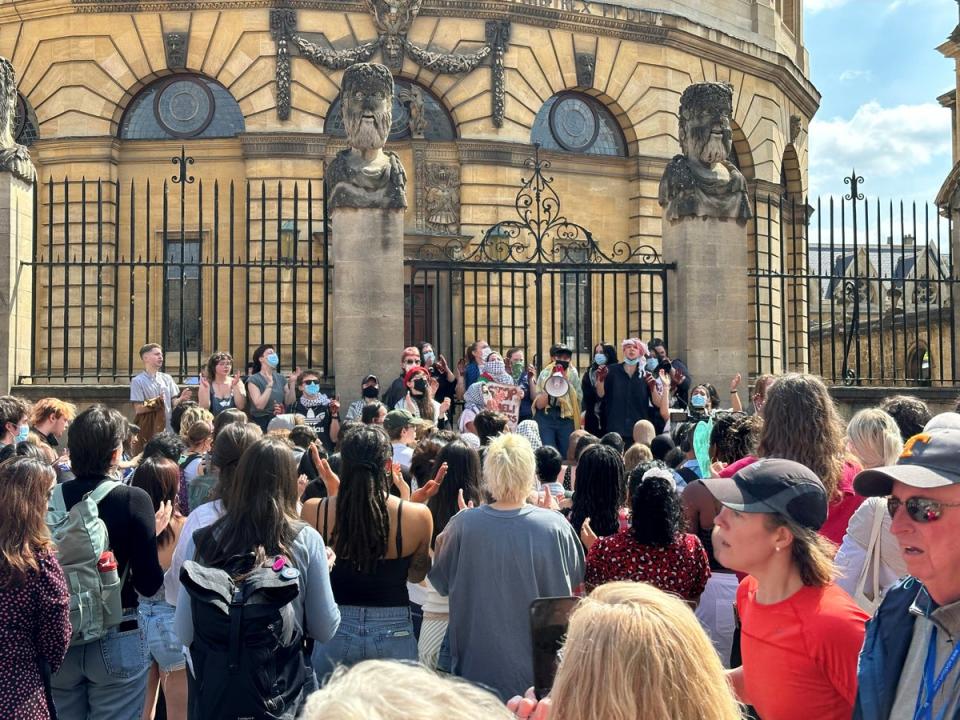
When asked about this, Sam says the Thawabit provides the “principles of our camp”, adding it includes a restructuring of Palestine with “Palestinians having Jerusalem as their capital again”.
The protest in Oxford began at the same time as one in Cambridge, where students are encamped in some 40 tents outside Kings College.
Outside the nearly 600-year-old college, Palestine flags drape the walls along with sheets of fabric repurposed as banners to display messages.
At the entrance, a chalkboard beside a marquee sets out a timetable for the day, with events such as a kite-making workshop along with a “rally and walk to deliver demands”.
Music plays from speakers inside, and protesters are offered free hot meals and drinks.
A final year PhD student says: “We think it’s absolutely disgusting that the university does not disclose all of its research collaborations and financial ties with companies and institutions complicit in Israel’s genocide.”
As in Oxford, the university has not sought to remove students from the encampment, and has issued a statement saying it is committed to freedom of speech within the law.
However, a Jewish fourth-year student, who was not participating in the protests, told The Independent he felt threatened by some of the messages displayed on banners at the encampment.
One read: “From Cambridge to Gaza, intifada”. The word “intifada” is believed here to refer to the two uprisings of Palestinians in the West Bank and Gaza (1987-1993 and 2000-20005) that aimed to end Israel’s military occupation of the territories.
The student said: “I’m not sure people have properly contemplated the meanings of these things that they’re shouting and writing. I’m worried antisemitism will only rise if these chants don’t stop.”
The organisers of the encampment, however, insist they have a zero-tolerance policy towards antisemitism.
Back in Oxford, the chilled-out vibe on camp continues into lunchtime. Many sit on the ground studying on their laptops, others make signs, help bring in supplies or simply take cover from the sun in a tent.
An aromatic stew is served from the canteen tent where opened packets of biscuits and chocolates lie on the table for people to help themselves.
The still is only broken by pro-Palestinian chants delivered intermittently over the microphone.
After lunch, the camp starts emptying as protesters file out for the rally outside the Sheldonian Theatre, where Oxford University’s vice-chancellor, Professor Irene Tracey, is honouring staff members for achievements in a special ceremony.
"We think it’s frankly absurd to be having a celebration at a time like this when all eyes are on Rafah,” says Amy Tess.
No one emerges from the theatre to talk to the protesters.
Later, we catch up with Ms Haskel, the Israeli politician, who says she was on her way to talk to students when she encountered the event. The flag, she says, came from the bag of one of her delegates.
Appearing on Israel’s i24News afterwards, the former soldier, who is in the UK to discuss the threat of Iran to politicians, laughs as she reflects on feeling uncomfortable during the “confrontation”, adding “I felt a sense of mission to raise my head”.
Oxford is different to London, Ireland and America, she says.
But her actions are perhaps an indication of the fragile tensions at university protests, with many hoping for no repeat of the trouble on campuses in the US two weeks ago.

